CRIMINAL CAPITALI$M
'Brazilian Escobar' and a Turkish Jet Filled With CocaineA jet full of cocaine in Brazil shows Turkey's increasing role in global drug trafficking. The UN drugs agency says the cocaine is sent via Turkey to EU countries, as well as Eastern European and Middle Eastern nations.
Pelin Ünker, Serdar Vardar
13 Apr 2022
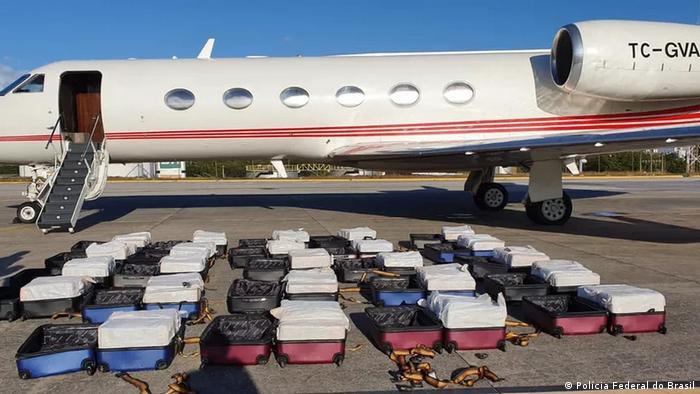
The seized Turkish jet belonging to Istanbul-based ACM Air charter company
On August 4, 2021, Brazilian federal police boarded a jet registered with the Istanbul-based ACM Air charter company in the northern city of Fortaleza. The private jet, which bore the tail code TC-GVA, was carrying one Belgian-Spanish passenger, four Turkish crew members and, police discovered, 1.3 tons of cocaine in 24 suitcases, with a market value of €45.6 million.
According to documents seen by DW, the jet had begun its journey in Malaga, Spain, and, after clearing inbound customs in Fortaleza, Brazil, flew to Ribeirao Preto, where it was scheduled to pick up four passengers bound for Brussels with a stop in Portugal. But, when it was raided by Brazilian police in Fortaleza, the only passenger was a man named Angel Gonzalez Valdez.
Footage of the raid was broadcast by media across Brazil and Latin America, as well as in Spain, Belgium and Turkey, and shared on social media by Turkish opposition politicians and prominent Brazilians abroad.
TRAFFICKING VIA TURKEY
According to the United Nations Office on Drugs and Crime, Turkey is increasingly becoming a transit point for global cocaine trafficking. From 2014 to 2020, the amount of cocaine seized in the country rose almost fivefold, according to the UNODC. In 2020, about 2 tons were captured.
Antoine Vella, a researcher with UNODC, told DW that Turkish traffickers are acquiring a greater share of the European cocaine market, with Turkey mostly used as a transit country for cocaine destined for southeastern and eastern Europe. "Large quantities have been seized in individual cases, both in Turkey and in Latin American countries en route to Turkey in 2020 and 2021," Vella said.
Cocaine is trafficked to Turkey both via air couriers and maritime shipments. "Air couriers often use Istanbul airport to land and may travel from South America as well as Africa," Vella said. "The recent increase is likely driven by the maritime shipments."
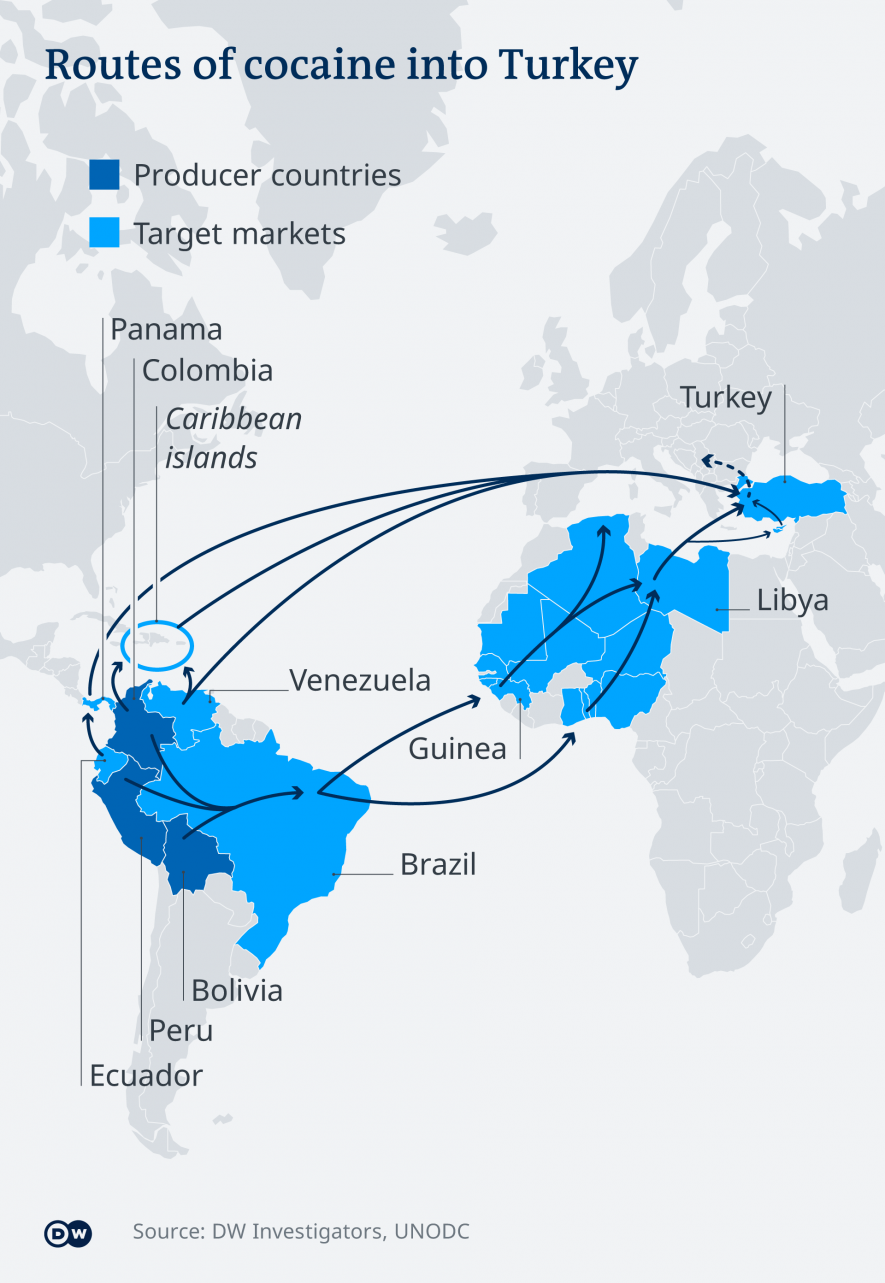
'BRAZILIAN PABLO ESCOBAR'
Documents and information obtained by DW suggest that a former Brazilian military police officer named Sergio Roberto de Carvalho may have been behind the Turkish plane that was seized in Fortaleza. According to media reports, Brazilian police also suspect's Carvalho's involvement. Malaga, the point of departure for the Turkish airplane's flight to Brazil, is known to be a base that he has used previously.
Carvalho, aka "the Brazilian Pablo Escobar," is one of the world's principal drug barons and purportedly trafficked nearly 50 tons of cocaine to Europe from 2018 through 2021. According to Spanish media, he was living in Spain with a fake Surinamese passport in the name of "Paul Wouter." Carvalho was detained as Wouter when the Spanish police confiscated a cargo of 1.7 tons of cocaine — in Paul Wouter's name — on a ship inbound from Suriname.
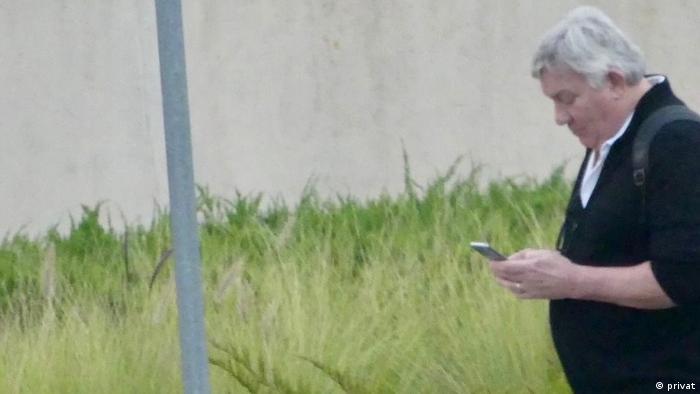
Sergio Roberto de Carvalho, known as the "Brazilian Pablo Escobar"
Because "Wouter" had a clean record, Carvalho made bail after four months, paying a fee of €200,000 while the case went through court. After almost two years and just before the court was to present its final judgment in August 2020, Carvalho's lawyer presented the judge with a death certificate declaring that "Wouter" had died and been cremated. The case was put on hold.
Months later, according to media reports, the Brazilian police informed Spanish authorities and Interpol that Paul Wouter was, in fact, Carvalho, and that he had left Spain with a different passport after having plastic surgery. Interpol initiated simultaneous operations targeting Carvalho's organization in Brazil, Spain, Portugal, the United Arab Emirates and Colombia. Carvalho himself, however, escaped.
Police found passports for multiple identities at his home in Portugal, as well as a van filled with €12 million in cash. Portuguese police believe that the van was intended as an exit plan.
A source told DW that the three passengers missing from the plane in Fortaleza were relatives of Carvalho's who had decided not to board at the last minute. The source said the Brazilian Escobar was known to have used companies in Dubai, Brazil, Portugal and elsewhere to launder billions of dollars. Sources also said Carvalho was using business connections in Turkey to launder money.
SUSPICIONS IN FORTALEZA
Employees with ground handlers Lider Aviacao at the airport in Fortaleza testified that ACM Air had insisted on paying in cash for the ground services, which, for security reasons, is an uncommon practice in the aviation industry. The employees also testified that the jet had taxied to a hangar other than the one designated.
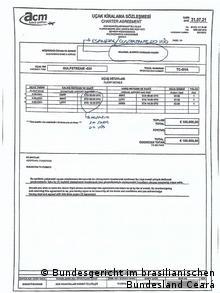
A Turkish-language bill shows the fee and departure for the ACM Flight
Contacted by DW, ACM Air employees did not reveal who had paid the €160,000 to charter the jet, which the company had bought from the Turkish state in 2017.
Angel Gonzalez Valdez, the lone passenger, was arrested, along with the Turkish pilot, Veli D. — whose full name is not being used as he has not been convicted of a crime — and the Turkish crew was interrogated. Valdez's attorney told DW that Valdez said that the pilot bore primary responsibility for the drugs onboard.
"At the hospital, Angel admitted he didn't know much about the operation and he just followed the pilot's orders," said the attorney, Maria das Dores Goncalvez Cavalcante.
The €160,000 would have been a hefty bill for a solo flight for the 61-year-old Valdez, an engineer who, according to documents examined by DW, had twice declared bankruptcy. On top of that, his attorney said, Valdez, who died in custody of terminal cancer on October 24, told her in September that he would leave €500,000, paid by a third party, to his family.
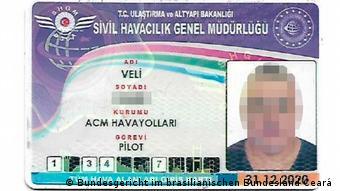
Retired Turkish Air Force pilot Veli D. flew the jet seized in Brazil with 1.3 tons of cocaine
After almost four months in custody in Brazil, the pilot, a retired Turkish Air Force officer, was released for lack of evidence — only to be detained when he arrived back in Turkey on December 26, 2021, and charged four days later. One day after the pilot's arrest, Seyhmus Ozkan, the owner of ACM Air, was arrested in Turkey.
That week, leaked pictures of Ozkan with the Turkish interior minister, Suleyman Soylu, and Ethem Sancak, a businessman with close ties to Erdogan, triggered a nationwide scandal. Ozkan's sister, Cigdem Ozkan, was also a parliamentary candidate for Erdogan's Justice and Development Party in 2015.
COCAINE'S LONG JOURNEY
The most recently reported seizure of cocaine en route to Turkey from Latin America came in February, when approximately 44 kilograms (97 pounds) of pure cocaine were seized in a banana container during inspections carried out at the port in Guayaquil, Ecuador. In fact, Ecuador is a name that comes up frequently in reports of cocaine shipments to Turkey.
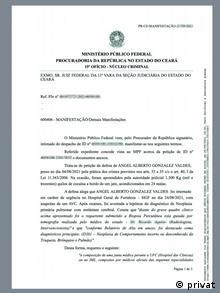
A leaked document describes Valdez's health while jailed on suspicion of trafficking
In June, 1.3 tons, also from Ecuador, were seized in Turkey's southern province of Mersin — the largest single haul of cocaine ever seized on Turkish soil. That would have been eclipsed had a shipment of 4.9 tons en route to Turkey not been seized at Colombia's Buenaventura Port in 2020.
Ecuador's biggest port, Puerto Bolivar, is managed by the Turkish company Yilport, which is owned by the Erdogan associate Yuksel Yildirim. According to Yilport's website, the agreement to modernize and run the port was signed during Erdogan's 2016 official visit to Ecuador, with then President Rafael Correa also looking on.
Most cocaine seized in or en route to Turkey is destined for distribution within other countries in Europe and the Middle East, but the domestic market is also growing, though it still pales with sales in EU countries such as Spain, the Netherlands and Germany. The Turkish Monitoring Centre for Drugs and Drug Addiction (TUBIM), a unit attached to the Turkish National Police, would not give specifics about the amount of cocaine passing through Turkey annually, or how it is then distributed abroad.
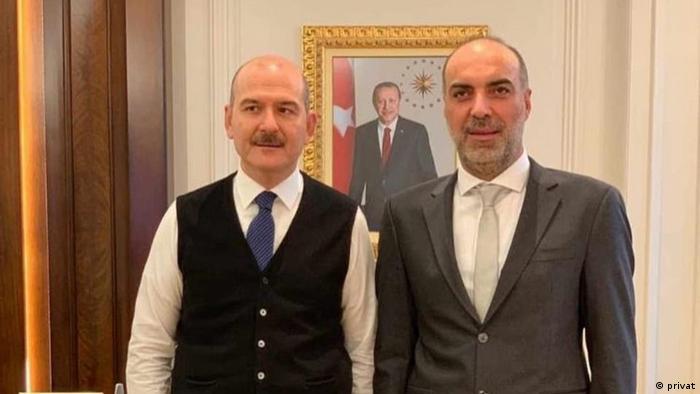
Ozkan (right) was close to prominent Turkish politicians, including the interior minister
As of 2018, according to the UNODC, the prevalence of Turks aged 15-64 who used cocaine was about five in 10,000. Nevertheless, the number of cocaine seizures rose almost fivefold from 2014 to 2017, from about 700 per year to nearly 4,000. Turkish authorities arrested almost 4,500 people in connection with cocaine-related offenses in 2020.
"It cannot be excluded that demand from an emerging domestic market may be contributing to increasing flows towards Turkey," the UNODC's Vella said. "These developments appear to form part of a broader pattern of expansion of the cocaine market and diversification of routes and actors observed in recent years."
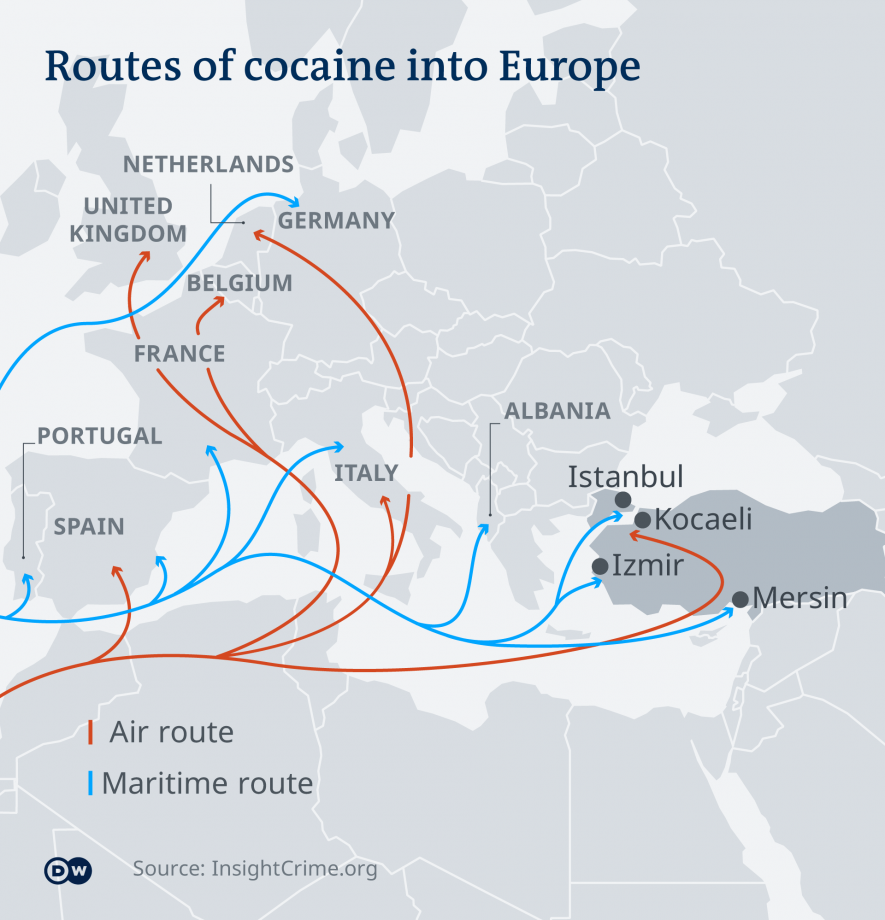
Investigations continue in Brazil and Turkey into who was behind the suitcases of cocaine seized from the ACM jet in Fortaleza. The extent of Brazilian Escobar Carvalho's network within Turkey remains murky. And the pilot, Veli D., and ACM owner Ozkan remain in jail.
The jet itself, used by Turkish prime ministers and presidents from 1988 until it was sold to ACM, has returned to official duty — in the fleet of the Brazilian federal police.
Edited by: Aydın Üstünel, Jülide Danisman and Milan Gagnon
DW
No comments:
Post a Comment